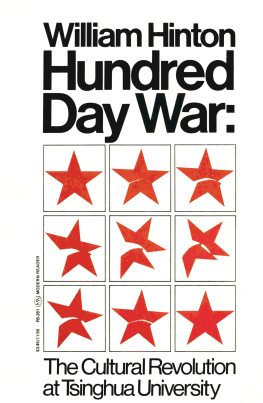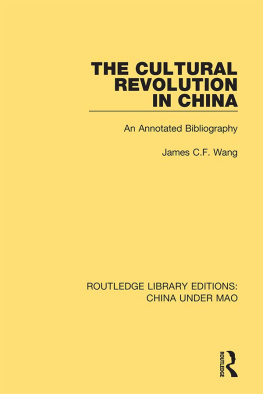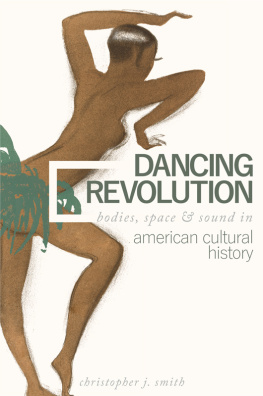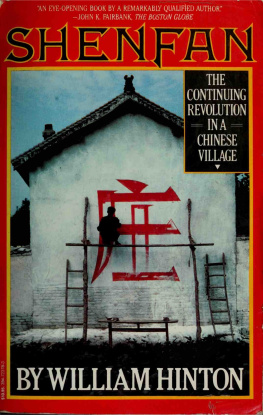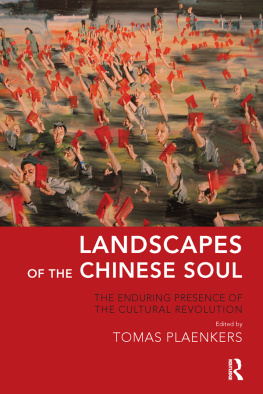Introductory Note
This is not a definitive history of the Great Proletarian Cultural Revolution at Tsinghua University. It must be considered rather a compilation of some rough notes taken from conversations with a few participants. Others who lived through the same events will surely find important omissions and distortions. The full story can only be told when Tsinghua people themselves get together and recreate it from the thousands of sources that now exist but may soon be dispersed beyond recall. Much of the story is recorded in collections of posters, leaflets, telegrams, and letters. Much more still resides only in the heads of people who took part. A concerted effort to collect and preserve this material on the part of the cadres, teachers, and students at Tsinghua would be invaluable. Whether it will ever be made is another question. Already important documents have been lost, key people have departed for distant provinces, while those who remain and could do the job are so busy reconstructing their institution that they tend to slight its history.
There is also a political problem, a problem of consensus. The ideological struggle has been very sharp; furthermore, it is still going on. Who can be trusted to sum up what happened? Who can interpret its real meaning? A dogmatic, sectarian spirit associated with the influence of Lin Piao still colors some peoples thinking. What actually happened tends to get mixed up with what should have happened, and so strong is the stigma attached to those who have ended up in disgrace that the purists want to leave them out of the story altogether, apparently on the grounds that to tell about their mistaken acts and ideas is equivalent somehow to advocating the same.
For the majority who reject this kind of dogmatism there is still the problem of prematurely judging political trends that are unclear. In the summer of 1971 Kuai Ta-fu, the nationally famous Tsinghua student leader, was under investigation as a May 16 conspirator. Since his case had not been settled, our informants first tried to tell their story without mentioning Kuai at all. As our questions went deeper this became impossible and Kuai emerged, almost larger than life, as an anti-hero. At that very time the whole campus population was rallying to expose him and the verdict seemed inevitable. Then came the Lin Piao affair and with it the possibility that the verdict on Kuai might eventually be modified. I do not mean to suggest here that there is any serious dispute about the facts, about what happened, about what Kuai actually did, but that there is room for doubt as to what it all means politically.
As of this writing the fall of Lin Piao has not been explained, at least not to the world at large. I have, as yet, no way of telling how much of what we heard in the summer of 1971 may have been colored by apologists for Lin Piao and his line at a time when the Defense Minister and Maos designated successor as Chairman of the Chinese Communist Party was on the verge of exposure and presumably, therefore, battling for his political life on many levels.
Why then tell this story now at all?
Well, fools rush in where angels fear to tread.
I feel that the story, partial and biased as it may be, still contains important lessons. For one thing the history of the Cultural Revolution at Tsinghua helps explain what the old, revisionist education was really like and why people rose up en masse against it. For another it shows how this education, the educators themselves, and their students were transformed, or at least how this transformation began. For American readers who have been led to doubt that any real issues existed, or that anything really changed after all was said and done, this should prove useful.
Far more important is the story of how right and left political lines developed in the mass movement, and in particular how an ultra-left line emerged, dominated the field for a time, and then was defeated. From beginning to end the soundness and vitality of Mao Tse-tungs approach to the socialist revolution stands out. By reviewing these events one can begin to understand the crucial role which Mao played in mobilizing the mass movement when this was the key to the future and then in guiding it through one crisis after another as right and left deviations threatened to destroy it. This can be a revelation for those who think that seizing power is the ultimate act of revolution.
I feel that the question of ultra-left thought and action, so central to the history of Tsinghua, is especially important for young Americans to ponder. On the one hand, there are voices in the West still insisting that the ultra-left represented the real revolution in China and that in the end Mao Tse-tung, in spite of many beautiful words, crushed the flower of Chinese youth. On the other hand, many American revolutionaries are as prone as their Chinese counterparts to accept ultra-left slogans and policies. People find it hard to identify counter-revolution when it comes in left clothing. They think, Anyway, left is better than right. Having learned to hate imperialism, they tend to assume that he who speaks most sharply and advocates the most extreme action hates imperialism the most; that the reddest flag is, ipso facto, the most revolutionary. If revolutionary politics were that simple no one would need to study Marx, Lenin, or Mao. Ultra-left politics are disastrous because they isolate the working class and make it impossible for working-class leaders to unite all forces that can be united against the main enemy. A common element disrupting unity here, as it so often has in China, is I am the core thinking, which maintains that I and my group are the real revolutionaries while people with other ideas, or people who have come to the same ideas at a later date, really dont deserve consideration as comrades and certainly cannot be in the vanguard.
The Tsinghua story clearly shows how damaging I am the core thinking can be, how it leads to arrogance, isolation, and finally to crimes against the people, all dressed in the most noble left rhetoric. If this can be understood, these rough notes will justify themselves.
In sharp contrast to I am the core thinking stands the united action of the Peking workers who ignored the most extreme provocations to bring hopelessly warring student factions together. What united the workers and eventually re-united the students was Marxism-Leninism-Mao Tse-tung Thought. Rarely has a more convincing demonstration of the power of this revolutionary theory been demonstrated than on the Tsinghua campus on July 27, 1968. If the extraordinary nature of these events and the political consciousness that made them possible can be understood in some measure from these notes, that too will justify their publication.
In the rapid editing which this book received in the spring of 1972, when it was being rushed for publication as the summer issue of Monthly Review, it proved impossible to check the transliterations from the Chinese according to a uniform system. For this reason, the text contains transliterations that are not consistent with the overall system used. The following is a list of the spellings as they appear in the text and as they should more properly have been spelled.
| Spelling in Text | Should Be |
|---|
| Kuai | Kuai |
| Hou Pu, Little Hou | Ho Pu, Little Ho |
| Tsu Hung-liang | Chu Hung-liang |
| Liu Tao | Liu Tao |
| Chiu Chih-ping | Chou Chih-ping |
| Liu Tsai Chang | Liu Tsai-tang |
| Wang Tieh-cheng | Wang Tieh-cheng |
| Wang Jen-ching | Wang Jen-ching |
| Chou Lung-hsin | Chou Jung-hsin |
| Tao Chu | Tao Chu |

